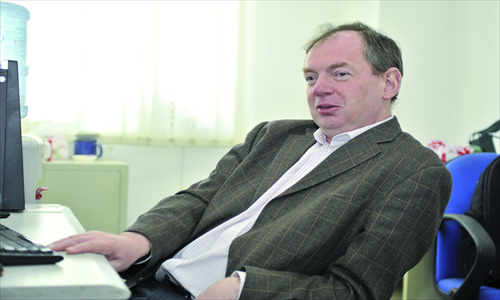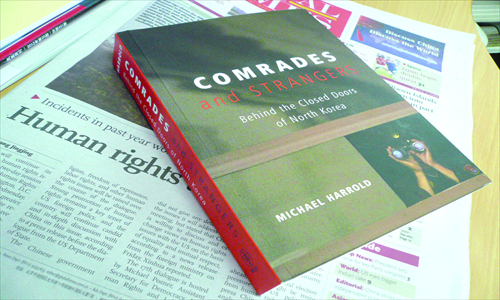An Englishman in Pyongyang

Sitting across a table from the affable, unassuming Briton, one would never guess that he'd spent seven years in a world that is still largely off limits to Western media.
Almost 20 years after he left Pyongyang in 1994, Michael Harrold, the first Briton to work and live in North Korea, is still surprised that his life led him to this mysterious nation, which remains inaccessible to most people even today.
After answering a bizarre job posting upon his graduation from Leeds University in the UK, Harrold, then 25 years old, found himself in Pyongyang in March of 1987 with a new job title: English language adviser. His main duty was to polish English translations of the collected works and speeches by North Korea's then president, Kim Il-sung, and his son and then heir, Kim Jong-il.
"I don't know why I, a 25-year-old from a capitalist country and therefore likely to be a source of all sorts of trouble, was chosen," Harrold said in an interview with the Global Times in Beijing, where he is a senior copy editor with CCTV News.
Harrold looks back with some amusement on his unlikely position as one of the first outsiders to see this sealed-off state. No information was available on North Korea in the UK, not even in libraries or diplomatic publications.
"I actually phoned the Foreign Office in London for any information about the country. The East Asia desk of the British Foreign Ministry got back to me, saying 'We don't know anything about the place. Could you please ring us when you get back and tell us what you've found out?'" he said.
Ten years after his departure from the country in 1994, Harrold turned his extraordinary experiences in North Korea into a book entitled Comrades and Strangers, in which he offers a rare and revealing glimpse of the country from a personal angle, including anecdotes of some rather unwelcoming treatment.
He came home one night to find that a suitcase holding his locked diary, which he hid in a cupboard, had been sliced open. Once, he was almost taken for a spy due to a tag on the raincoat he brought from London that read "Made in South Korea."

A privileged life, with conditions
"It was sort of fun because it was so unusual; on the other hand, it wasn't easy. It was very lonely," said Harrold, summarizing his life as one of the few foreigners in the exotic land.
Like his foreign colleagues, Harrold lived and worked in the guest house that belonged to the Workers' Party of Korea.
"I was in an extremely privileged position," he said. In addition to free transport to tourist attractions and ready meals prepared by a cook, the job gave him access to the ruling classes, allowing him to witness several major moments in the country's history.
Less than a month after he arrived, Harrold was invited as a VIP guest to attend the 75th birthday of Kim II-sung, alongside important officials and foreign ambassadors.
"The Great Leader was just 20 or 30 meters from me, quite exciting for a young man in his 20s," he recalled.
However, early on, Harrold found himself in a sort of confinement. Foreign experts were told not to leave the guest house on their own. Plus, any contact with the locals was prohibited, resulting in a "cat and mouse game" in which Harrold tried to evade his interpreters and guards in the hope of meeting locals.
Two sides of the story
Harrold's book has few fellows given its subject, and the readers' comments on book-selling websites demonstrate how divisive the topic of North Korea is. Many netizens fault the author for not providing inside details of sensitive issues like the country's nuclear intentions. "Presumably I visited these prison camps, and got to interview top scientists for its nuclear program. Come on! That could never happen!" said Harrold. "I wrote only what I saw and heard, and what I felt about the country." In fact, the veteran expat said this rare experience taught him how to see both sides of an issue.
Despite the world's condemnations of North Korea's nuclear program, Harrold said he can understand Pyongyang's perspective.
"They are seriously expecting an attack from the US," he said, recalling a period in 1993 during which the country lived in a state of semi-war that saw citizens blocking out their windows with curtains at night, and strict curfews.
Harrold went on to point out how difficult it is for people to find a middle ground when discussing North Korea these days. He feels that the perspective he conveys in his book is a lonely one. "Certain people are violently anti-North Korea; others are radically pro-North Korea. My book sits in the middle of this chasm."
Settling down after the adventure
After leaving North Korea, Harrold moved to China and continued working as a copy editor, this time for the Xinhua News Agency and CCTV, both State-run media outlets.
Like his colleagues at CCTV, he is often the target of criticism from the outside world, as he is seen as a foreign mouthpiece representing China. But this doesn't seem to bother Harrold at all.
"Well, having worked for North Korea for quite a long time, I find the propaganda I encounter in China is nothing. All I am doing is presenting a story, an argument, a point of view, in the clearest way that I can. It's then up to the audience whether to accept or reject," said the seasoned media professional, who now lives in Beijing with his wife and two boys.
Since 1994, Harrold has been back to North Korea only once, as a guide for his friend's tour company, though later he discovered that 22 of the 24 tourists were journalists from the West.
Though many changes have occurred over the past two decades, including the establishment of diplomatic ties between the UK and North Korea in 2000, Harrold says he does not wish to return there.
"Back in 1987, I was quite happy just to listen to BBC News on my radio so as to keep in touch with the world, as at that time, there was no Internet, no e-mail, no satellite television. But today, I just couldn't imagine living with only my radio there," he said.
Though still living in an apartment inside the Friendship Hotel, well known for its accommodation of foreign experts in Beijing, Harrold sees himself as having settled down, and he even sends his two children to the local Chinese school.
In contrast, Harrold says North Korea will always be a foreign country to him, far and remote in every sense. "Comrades and Strangers hints at the way I feel about the country, or rather how some people there regarded me, in that I'd gained some sort of acceptance (the comrade)," he explained, "but would never be anything other than an outsider (the stranger)."